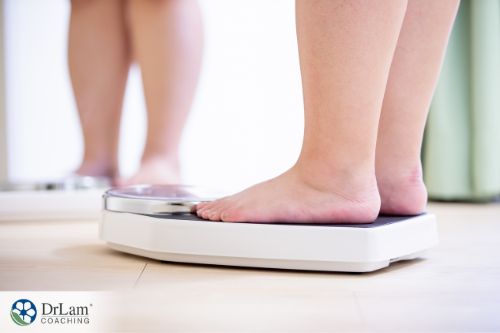 Sleep and weight are two important factors that can directly affect your wellness and your quality of life. In recent years, the amount of sleep by the average American has declined whereas the average weight and BMI have increased.
Sleep and weight are two important factors that can directly affect your wellness and your quality of life. In recent years, the amount of sleep by the average American has declined whereas the average weight and BMI have increased.
You may think that these two factors work independently of each other, however, sleep and weight are connected and can affect each other directly. This is an important factor to consider when you are trying to optimize your well-being as well as weight.
These two factors are incredibly important in your day-to-day health but how do sleep and weight affect each other? Studies have shown that as the amount of sleep decreases, your weight increases and vice versa.
There are multiple reasons and theories behind this sleep and weight connection, let’s take a look at some of the main reasons.
Hunger is controlled by Ghrelin and Leptin, two hormones produced by the brain. Ghrelin increases hunger whilst Leptin reduces hunger and gives you the feeling of fullness after a meal. Throughout the day, the levels of these hormones will fluctuate and control your appetite.
Ghrelin and Leptin can become imbalanced with a lack of sleep. Ghrelin increases whilst Leptin decreases. This imbalance can lead to an increase in appetite and a reduced feeling of fullness. This increases the total calories consumed. If this increase is done continuously and leads to an increase in weight.
You may have found that your food choices can be altered after a sleepless night. This may be in the form of a coffee, energy drink, or energy bar to help you get the boost of energy you need to get through the day.
Foods that are promoted to increase energy such as energy drinks and bars are typically high in energy, carbohydrates, and sugar. This can result in an overconsumption of calories during the day. If the calories consumed are greater than the output in calories it can result in weight gain especially if done continuously.
Studies have also shown that a lack of sleep can result in an increase in sweet, salty, and fatty foods. These foods are typically high in energy and can contribute to an excess of calories.
During nights of little sleep, it can also increase the temptation to have a midnight snack, further increasing your calorie intake.
These changes in food choices are all linked to your brain, during sleep deprivation two regions of the brain are mainly affected. These two regions are the prefrontal cortex and amygdala. While these regions may have funny-sounding names they are important regions that are involved in memory, decision making, and self-control.
The prefrontal cortex is very sensitive to changes in sleep and when you experience a lack of sleep, this region is affected and can affect self-control and decision making. This can then influence the types of foods you choose and how much you eat.
Whilst the prefrontal cortex is in charge of these processes, the amygdala is in charge of your emotions. A disruption in sleep increases the activity of the amygdala, heightening your emotions. This region then becomes more responsive to activities that are perceived as pleasing and rewarding.
This combined with a decrease in self-control results in poor food choices and an increase in the quantity of food.
Your metabolism is a chemical process that occurs within your body and converts the foods and drinks you consume into energy. Your body uses this energy to function. Certain activities such as physical activity can increase metabolism whilst activities such as sleep reduces your metabolism by as much as 15% and reaches the lowest in the morning.
 Studies have shown that interruptions in sleep can cause your metabolism to become imbalanced and can negatively affect your metabolism. This results in your body burning energy inefficiently, this imbalance in the metabolism can result in weight changes.
Studies have shown that interruptions in sleep can cause your metabolism to become imbalanced and can negatively affect your metabolism. This results in your body burning energy inefficiently, this imbalance in the metabolism can result in weight changes.
Poor sleep also increases the amount of cellular stress your body experiences, glucose intolerance, and insulin resistance. These can further result in weight gain and being unable to lose weight.
After a sleepless night, your energy level is not what it normally can be. This energy reduction can lead to reduced motivation to exercise and be active. An energy reduction can also lead to certain sports such as weight lifting being less safe due to a reduction in concentration.
Whilst exercise may be the last thing you want to do after little sleep, getting outside and exercising can improve concentration as well as sleepiness and can help give you the energy to tackle the rest of the day.
Sleep not only affects weight but increased weight specifically obesity can affect the quality and quantity of sleep. Increased weight and obesity increases the risk of sleep conditions such as insomnia and sleep apnea developing.
Sleep apnea is a medical condition that affects the airways and affects breathing. Disruptions in breathing whilst asleep decreases the quality as well as quantity of sleep.
Obesity not only increases the risk of sleep apnea from developing but it also can increase the severity of symptoms further affecting sleep.
Increased weight or obesity can increase the prevalence of reflux and asthma. These symptoms can be heightened at nighttime and can contribute to a reduction in sleep quantity and quality.
On average adults should get between seven to nine hours of sleep a night to optimally support health. Children and teenagers will need more sleep to help support growth and development.
Factors such as exercise, the intensity of the job, illness, or medical condition can increase the amount of sleep needed.
Having adequate sleep can enhance your energy levels, increase the likelihood of you exercising during the day, and can help moderate your appetite and your food choices. If you are looking at changing your weight or maintaining your weight, having adequate sleep will help you achieve this goal.
AFS is a syndrome caused by chronic stress on the body and is characterized by multiple symptoms which include disturbances in sleep and weight.
The NeuroEndoMetabolic (NEM) Stress Response System is a mechanism that your body has to combat stress placed on your body. This system is made up of six different circuits that are composed of different organs. The one circuit involved in the Neuroaffect system and is made up of the brain, gut microbiome and autonomic nervous system. It is primarily responsible for dealing with mental and emotional stress.
Symptoms of AFS that affect the brain are depression, anxiety, and insomnia including struggling to fall asleep and struggling to remain asleep during the night. Whilst insomnia directly affects your sleep, mental health symptoms can indirectly influence your sleeping patterns. This sleep disruption can result in disruptions in your weight.
Sleep and weight aids may be tempting especially if you are having challenges with your sleep and weight. However they can sometimes do more harm than good.
 During AFS, the body is very sensitive and can negatively respond to treatment. This is heightened by the fact that sleep and weight aids can have multiple ingredients in them. If these products are supplements the products are not regulated by the FDA and the quality and efficacy of the products is not always guaranteed.
During AFS, the body is very sensitive and can negatively respond to treatment. This is heightened by the fact that sleep and weight aids can have multiple ingredients in them. If these products are supplements the products are not regulated by the FDA and the quality and efficacy of the products is not always guaranteed.
If you have AFS or are experiencing symptoms of AFS, chat to your healthcare provider to help design a plan for you that will support your body. This will help prevent your body from reacting negatively and placing your body under additional stress.
Not only does sleep affect your weight but sleep also helps your body heal. Sleep helps to provide restorative, protective and energy conserving functions that help aid in healing.
The quality and quantity of sleep will influence your body's ability to repair damage within the body and helps to increase your immune system.
If you are struggling with your sleep and weight, practicing sleep hygiene can help you get the sleep you've been daydreaming about.
Sleep hygiene includes:
Sleep and weight are crucial in maintaining health and wellness. Not only do they affect these aspects separately but they directly affect each other. If you are looking to improve your weight, sleep hygiene can help to indirectly improve your weight. As your weight improves, your sleep quality and quantity will also improve.
If you are currently experiencing sleep or weight disturbances and would like to chat with a professional, you can call us at +1 (626) 571-1234 for a free** no-obligation phone consultation where we privately discuss your symptoms. Alternatively, you can send us a question through our Ask The Doctor System by clicking here.
Whilst napping may be tempting, try to avoid napping if you are currently struggling with your sleep. If you are looking to improve your body’s connection to sleep and weight, napping is not shown to affect weight loss. Rather focus on improving the quantity and quality of sleep at night.
